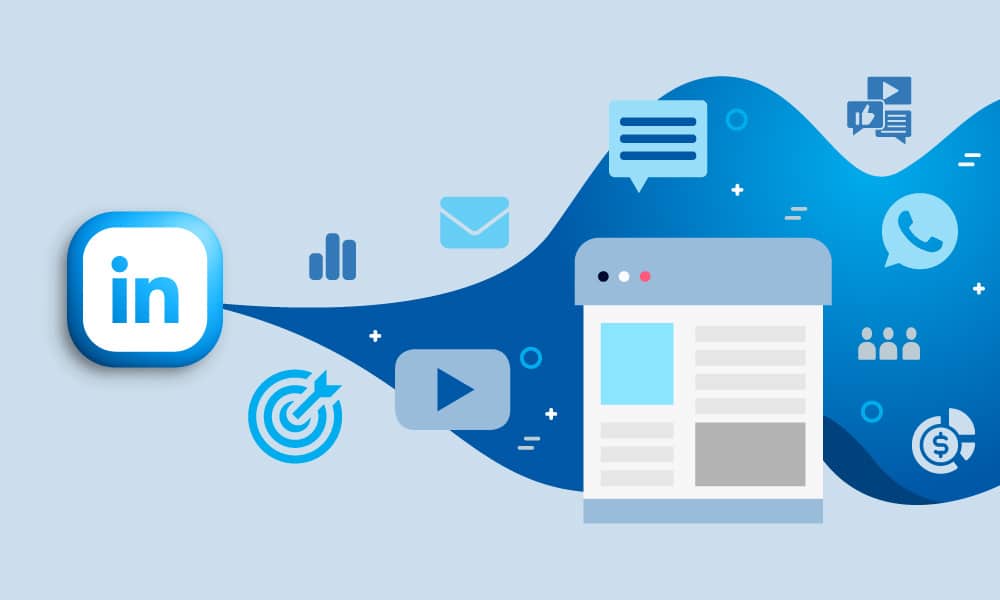What is B2B Marketing Automation

In the dynamic business environment, industrial B2B firms progressively embrace marketing automation. This innovative tool helps streamline marketing processes and automate routine tasks.
Business owners, operations managers, and marketing professionals can reap advantages from this technology. Utilizing these tools can revolutionize your customer interaction strategies and lead nurturing efforts.
This piece explores the concept of B2B marketing automation, its functionality, and its practical benefits. Discover tips to maximize its impact on your business endeavors.
Key Takeaways:
- Marketing automation empowers your team to focus on strategic initiatives by automating repetitive tasks. This fosters higher productivity and allows them to craft impactful marketing campaigns.
- Learn the tools and techniques of marketing automation to seamlessly manage lead nurturing and scoring. Ensure every lead receives the appropriate attention, maximizing your conversion potential.
- Marketing automation can significantly increase the qualified leads you generate, driving sales and fueling your business growth.
- Implementing marketing automation is a breeze with our insights into common pitfalls and practical tips to avoid them. This sets you up for a successful and optimized automation journey.
- Explore through key performance indicators (KPIs) and metrics to effectively measure the effectiveness of your marketing automation strategies. This allows for continuous optimization and maximizes your return on investment (ROI).
What Is B2B Marketing Automation?
B2B marketing automation employs automation software to streamline repetitive marketing tasks, fundamentally altering how companies engage with potential customers.
As defined by Gartner, B2B marketing automation platforms (B2B MAPs) are advanced solutions that bolster demand generation processes at a scale previously unattainable with manual efforts alone. This technology enables businesses to manage large-scale marketing campaigns efficiently, ensuring no opportunity for engagement is missed.

The impact of these platforms is substantial in today’s fast-response market environment. According to a report, over 78% of customers choose to purchase from the first responder to their query.
By automating responses, companies enhance their chances of securing a customer and significantly reduce the time to connect with potential leads. This swift engagement is crucial in a landscape where every moment counts, making marketing automation an invaluable tool for B2B companies aiming to stay competitive.
How Does Marketing Automation Work?
Marketing automation uses sophisticated tools and software that automatically manage and execute repetitive tasks.
Core functionalities include email nurturing, lead scoring, and setting up automated workflows that target customers and leads at precisely the correct times.
A prime example of marketing automation in action is visible in simple automation flows like those for email marketing automation. Once set up, these flows can automatically send emails based on specific triggers, such as a customer’s behavior or a new lead entering the system.
This could involve sending a welcome email when someone subscribes to a newsletter or initiating a series of educational emails following a product inquiry, effectively nurturing leads through the sales funnel without manual intervention.
The real power of marketing automation lies in its ability to operate in the background continually, refining customer engagement and ensuring consistent follow-ups.
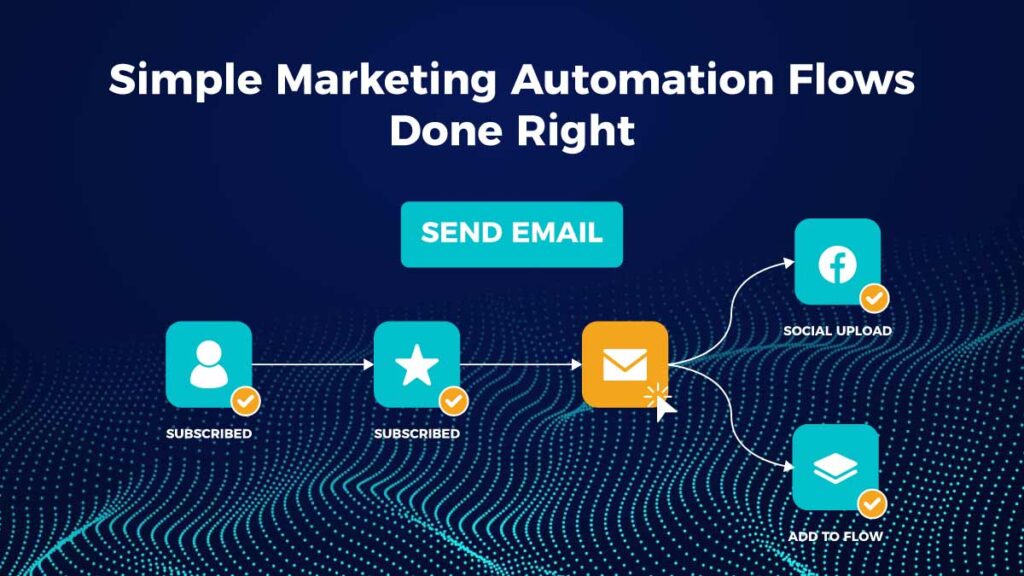
Building on the established marketing automation platform (as highlighted by MarketingPlatform), automated workflows become self-sufficient once configured. This translates to significant time savings for your team.
Furthermore, it eradicates the risk of inconsistent or sporadic marketing efforts, leading to a sustained generation of value for your business. In essence, this streamlined approach fosters both efficiency and effectiveness within your marketing initiatives.
How Can B2B Companies Benefit from Marketing Automation?
Leveraging marketing automation empowers B2B businesses to unlock many benefits, including enhanced productivity and seamless marketing scalability.
A core advantage lies in automating repetitive tasks, which frees marketing teams to dedicate more resources to strategic initiatives and less to time-consuming manual work.
In fact, a recent survey revealed that over half (53%) of B2B businesses integrate marketing automation into their daily operations, with a significant number planning future implementation. This highlights the growing recognition of automation’s role in optimizing marketing performance within the B2B landscape.
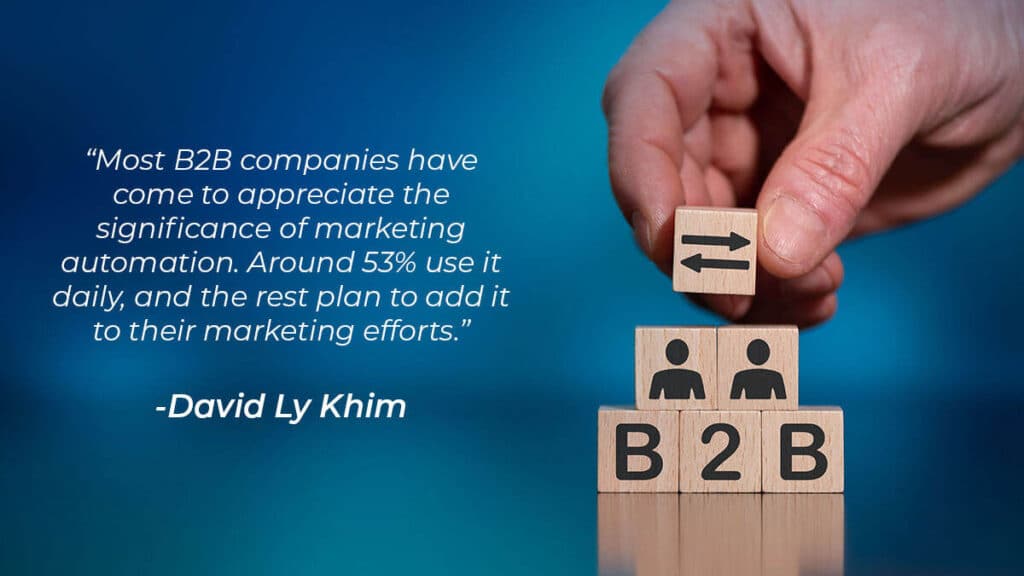
For instance, companies may automate lead nurturing efforts to guarantee consistent engagement with prospects throughout the buying cycle. Once the campaigns are configured, this eliminates the need for manual labor. Maintaining a cordial relationship with potential customers through frequent involvement raises the possibility of conversion.
Marketing automation also aids in more precise client segmentation and targeting. Automated systems can evaluate client data and behavior to generate highly tailored marketing messages more likely to resonate with each group.
This personalized strategy not only improves client pleasure but also increases the effectiveness of marketing campaigns, resulting in higher ROI.
These functionalities streamline operations and enable B2B organizations to handle high volumes of leads quickly, guaranteeing that no opportunity is lost due to oversight or reaction time.
Why B2B Marketing Automation Matters?
Efficiency and strategic focus are not just beneficial but also essential in the competitive B2B markets.
Marketing automation empowers you on both fronts. Automating repetitive tasks frees your team from the mundane, allowing them to concentrate on crafting impactful, strategic initiatives.
This crucial shift in focus unlocks a dramatic transformation in your marketing effectiveness and overall productivity.
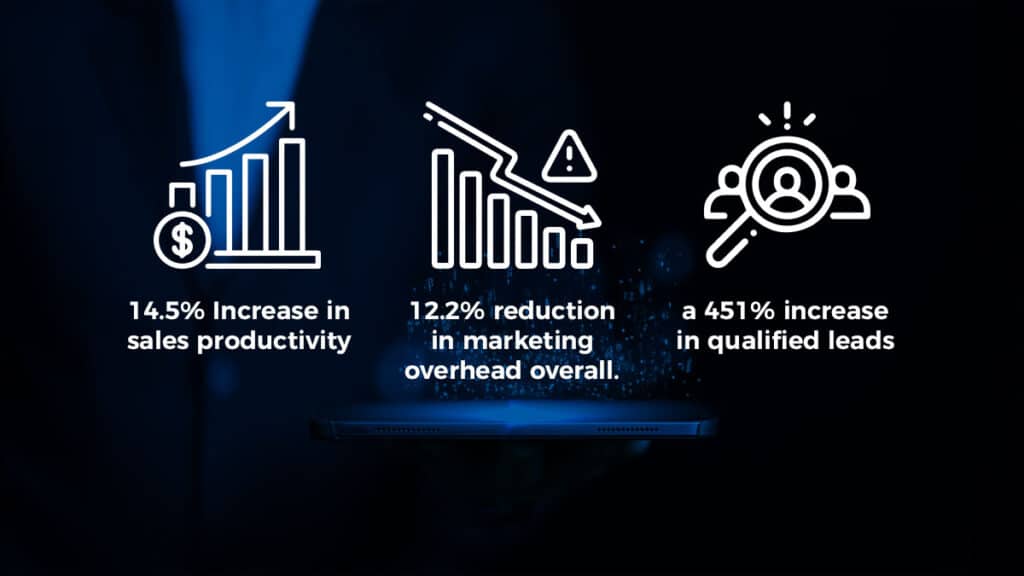
The statistics speak volumes: According to Salesforce, marketing automation has been shown to drive a 14.5% increase in sales productivity and a 12.2% reduction in marketing overhead.
These figures highlight the efficiency of automation and its capability to boost bottom-line results.
Moreover, companies implementing marketing automation for nurturing prospects report a staggering 451% increase in qualified leads. This surge in lead quality underscores the vital role that targeted, automated communications play in engaging and converting potential customers.
The growing competitiveness in the B2B sector makes these advantages even more critical. As companies vie for market share, the ability to rapidly adapt and respond to market conditions with minimal resource expenditure can set leading businesses apart.
Marketing automation provides the tools necessary to achieve these objectives, making it an indispensable part of modern marketing strategies.
How to Measure the Success of B2B Automation?
Evaluating the efficacy of your B2B marketing automation hinges on a data-driven approach. Tracking a comprehensive range of key performance indicators (KPIs) unveils the efficiency and effectiveness of your campaigns.
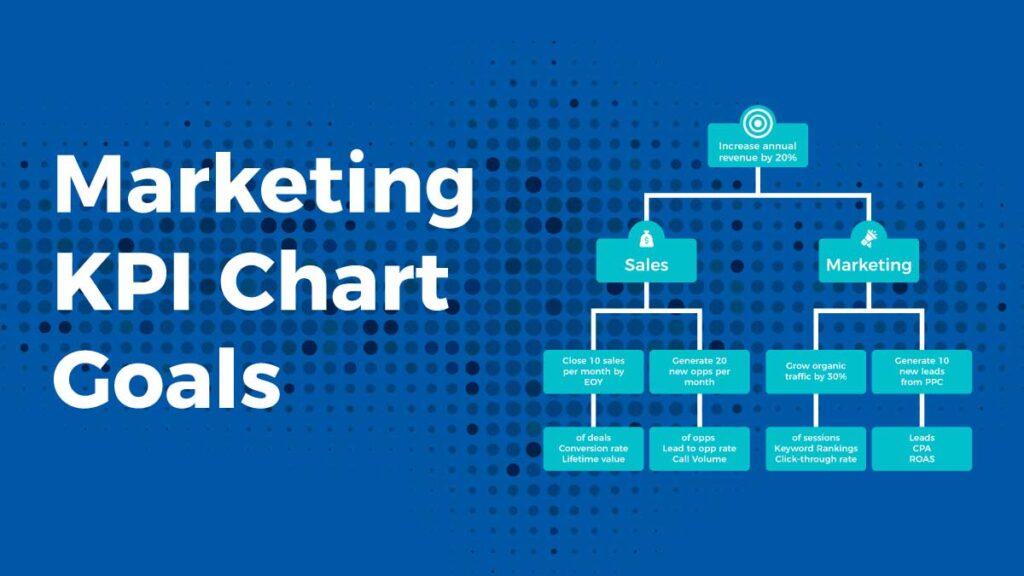
Understanding these metrics empowers you to optimize strategies and achieve demonstrably positive outcomes. Let’s explore some crucial KPIs:
- Marketing Qualified Leads (MQLs): This metric acts as a preliminary filter, identifying prospects who have exhibited genuine interest in your offerings.
- Sales Qualified Opportunities (SQOs): These leads demonstrate significant potential for conversion, providing valuable insights to inform targeted sales strategies.
- Web Traffic: This metric gauges the volume of visitors to your website, reflecting the success of your SEO and marketing efforts in boosting online visibility.
- Leads In: This measure assesses the efficacy of paid marketing campaigns by quantifying generated leads, offering insights into return on investment (ROI).
- Closed-Won Deals: This metric represents the ultimate validation of marketing and sales efforts, reflecting the number of contracts signed and deals successfully closed.
- Cost per Acquisition (CAC): A vital efficiency metric, CAC calculates the cost of acquiring a new customer, crucial for budgeting and financial planning.
- Average Deal Size: This indicator aids in sales forecasting by revealing the average revenue generated per closed deal.
- Average Sales Cycle: This measures the time elapsed between initial contact and deal closure, providing valuable insights for optimizing sales strategies.
- Lead to Close Conversion Rate (CVR): This critical metric reflects the number of leads that successfully convert into paying customers, indicating the overall effectiveness of your marketing funnel.
Should Your Business Use Marketing Automation Platforms?
Leveraging marketing automation platforms necessitates a strategic evaluation to maximize their impact on your business’s operational efficiency and growth trajectory.
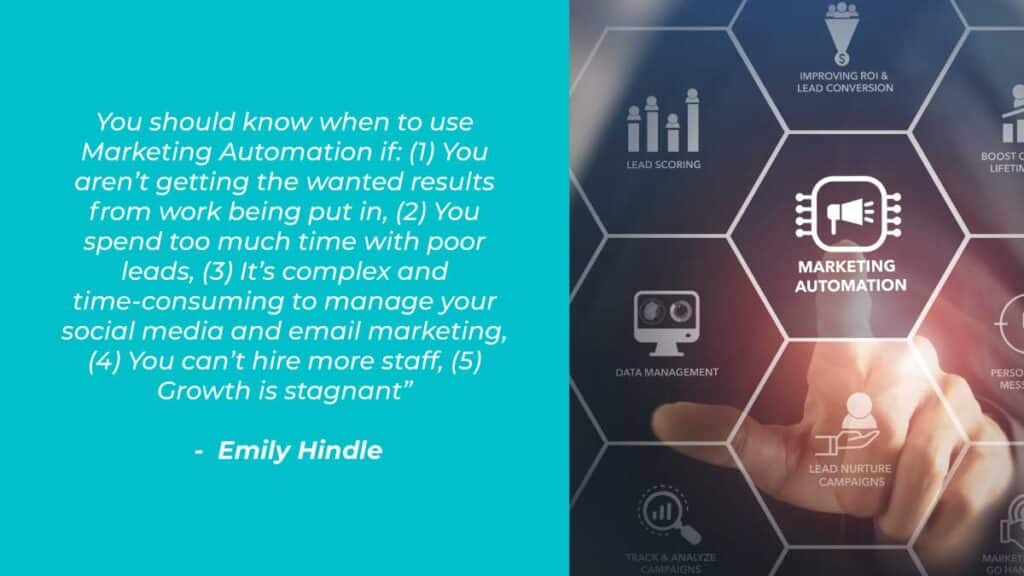
Here’s a breakdown of key scenarios where automation integration can yield significant benefits:
- Inefficient Processes: If your marketing efforts, despite dedicated resources, fall short of desired outcomes, automation can be a game-changer. Streamlining workflows frees up your team to focus on higher-level strategies.
- Resource Management Challenges: Struggling to manage lead nurturing, social media engagement, and email marketing effectively? Marketing automation tackles these repetitive tasks, allowing your team to focus on higher-value activities.
- Staffing Limitations: Budgetary constraints hindering team expansion? Automation empowers your existing team to manage and scale marketing efforts efficiently.
- Stagnant Growth: Has your business growth stalled? Automation tools can introduce fresh efficiencies and capabilities to revitalize your marketing strategy and reignite growth.
The B2B marketing automation landscape offers a diverse range of tools, each designed to address specific needs. From CRMs that streamline lead management and customer interactions to email marketing platforms that automate communication and social media tools that schedule and analyze posts, the optimal solution hinges on your unique business challenges and objectives.
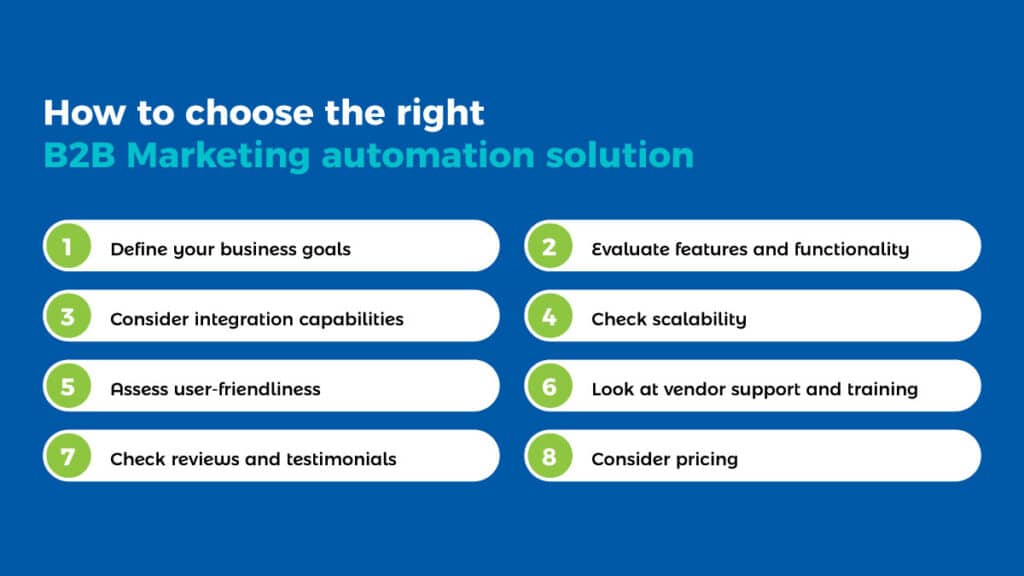
By carefully evaluating these factors and aligning them with your business’s specific needs, you can make an informed decision on whether marketing automation platforms are the key to unlocking growth and efficiency within your organization.
How Can B2B Marketers Use Marketing Automation?
Leveraging marketing automation empowers B2B marketers to achieve a significant leap in both operational efficiency and campaign effectiveness.
This translates to streamlined workflows, maximized team productivity, and impactful marketing efforts that deliver measurable results.
Now, let’s dig into some examples of effective marketing automation:
Automated Email Workflows
Automated email workflows, triggered by actions like newsletter signups, website form submissions, or even link clicks within marketing emails, are a cornerstone of marketing automation. Imagine a prospect subscribing to your blog – they’d automatically receive a welcome message followed by nurturing emails that pique their interest in your offerings. This streamlined approach fosters efficient lead engagement.
Lead Management
Automating lead scoring and nurturing can dramatically improve the efficiency of your sales cycle. For instance, upon converting on an offer, a user can be automatically tagged and progressed through the sales funnel, ensuring they receive targeted information tailored to their specific buying stage. This intelligent approach optimizes lead nurturing and conversion.
Social Media Engagement
Marketing automation can even manage social media interactions. For example, a prospect clicking on a social media ad can be instantly entered into a customized nurturing track that aligns with the content they engaged with. This ensures continued engagement and facilitates lead qualification.
Best Practices: To effectively implement these automation strategies, it is crucial to:
- Clearly Define Triggers and Responses: Each automated workflow should be meticulously crafted with clear triggers and corresponding responses aligned with your overall marketing goals.
- Segment Your Audience: Tailoring communications to specific audience segments based on needs and behaviors increases relevance and engagement. This ensures your marketing efforts resonate with the right people at the right time.
- Monitor and Optimize: Continuously analyzing the performance of your automation strategies and making data-driven adjustments is paramount for success. This ongoing optimization process allows you to refine your approach and maximize the effectiveness of your marketing automation efforts.
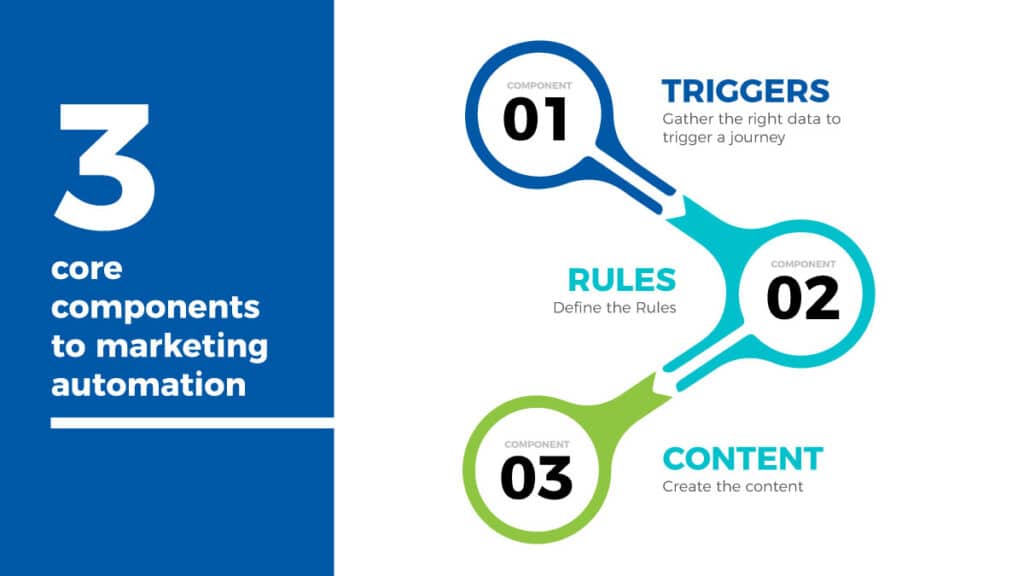
Leveraging marketing automation techniques fosters a more personalized approach to nurturing your B2B audience. This translates to timely and relevant interactions that resonate with your target market. The result? Increased conversions and a loyal customer base cultivated through these strategic interactions.
Examples of B2B Marketing Automation

processes.
Marketing automation has revolutionized the B2B landscape, empowering companies across industries to achieve operational efficiency and personalize customer interactions at scale.
Let’s explore some real-world examples showcasing its successful application:
Automated Lead Nurturing
Imagine a software company specializing in project management tools. They leverage marketing automation to nurture leads effectively. For instance, a visitor who downloads a white paper automatically receives a follow-up email suggesting a relevant free webinar. This keeps the conversation flowing and gently guides them through the sales funnel.
Personalized Content Recommendations
A financial services firm leverages automation to deliver hyper-personalized content to its clients. This could include relevant articles, market analyses, and regulatory updates, all tailored based on the client’s past interactions and preferences. This approach reinforces the firm’s expertise and fosters high client engagement.
Social Media Trigger Campaigns
An industrial equipment manufacturer leverages automation to respond strategically to social media activities. When potential or existing clients mention relevant topics online, the system prompts the sales team to share appropriate content from the company’s resources. This keeps the brand relevant and positions them as proactive thought leaders in the industry.
Event-Driven Automation
A healthcare solutions provider optimizes event management through automation, from registration confirmations to post-event engagement. This ensures a seamless experience for attendees and maximizes the impact of each event.
Client Onboarding Processes
A cloud services provider automates client onboarding, sending targeted welcome emails that help new clients navigate their services efficiently. This structured approach fosters a smooth transition and enhances client satisfaction from the very first interaction.
These diverse examples demonstrate how B2B companies across industries can leverage marketing automation to streamline operations, enhance customer engagement, and drive sustainable business growth.
Why Do Marketing Automation Efforts Encounter Failures?
While marketing automation offers many benefits, it’s not without its potential roadblocks.
Understanding these common pitfalls is paramount to avoiding them and ensuring a successful automation journey.
Unclear Objectives
One critical stumbling point for automation efforts is the absence of clearly defined objectives. Without specific goals in place, measuring success or return on investment (ROI) becomes an uphill battle. This can lead to misaligned strategies and wasted resources.
Data Quality Concerns
Marketing automation thrives on the quality of the data it utilizes. Inaccurate or incomplete customer information, for instance, can lead to poorly targeted marketing campaigns and the generation of low-quality leads. Data hygiene is essential.
Insufficient Integration
Fragmented information flow between marketing and sales departments can impede seamless automation. Ensuring all systems are integrated and allow for real-time interaction is crucial for optimal performance.
Lack of Training
Neglecting to adequately train employees on utilizing automation tools can lead to underutilization or misuse, hindering their potential benefits. Investing in training empowers your team to maximize the power of automation.
Content and Engagement Challenges
Compelling and relevant content is the lifeblood of successful automation. Without this foundation, even the most advanced tools may struggle to maintain brand image or effectively engage customers. Regular content updates ensure consistent engagement.
Recommendations
By proactively addressing these challenges, B2B businesses can maximize the potential of marketing automation and avoid common pitfalls. Here are some key recommendations:
- Define clear goals for each automation initiative and communicate them effectively across your organization.
- Implement a data cleansing process to ensure accurate and up-to-date customer information.
- Foster collaboration and data sharing between marketing and sales departments.
- Provide comprehensive training for all personnel using automation tools.
- Regularly update content to keep it fresh, engaging, and aligned with brand messaging.
By tackling these challenges head-on, B2B companies can leverage marketing automation to streamline their marketing efforts, boost conversion rates, and achieve significant business transformations.
Remember, successfully navigating the intricacies of marketing automation requires a well-defined strategy and a commitment to continuous improvement.
Ready to implement these strategies in your business?
Blue Atlas empowers B2B businesses to harness the transformative power of marketing automation. We specialize in crafting and executing marketing automation solutions meticulously tailored to your unique business objectives.
Contact us today to explore how our marketing automation services can drive your business expansion.

